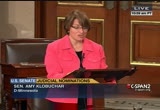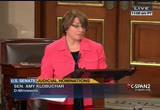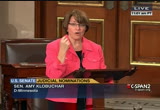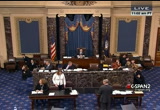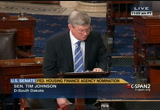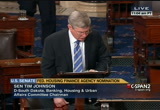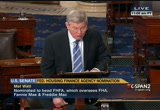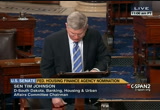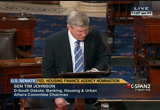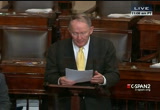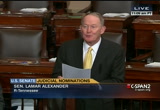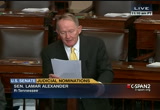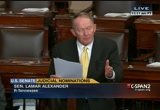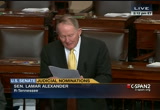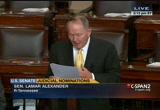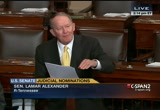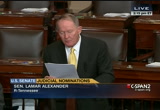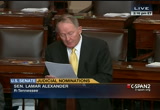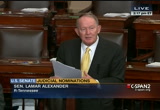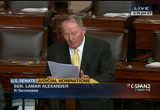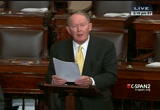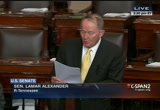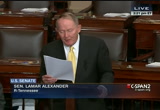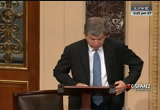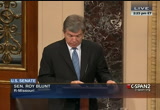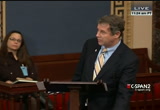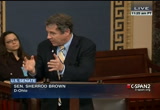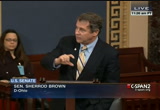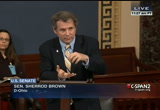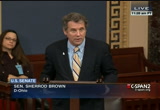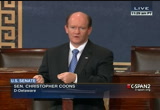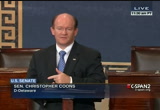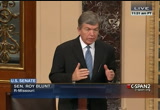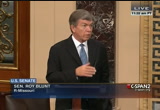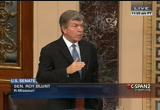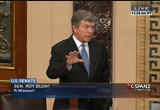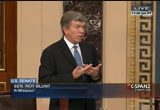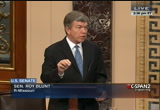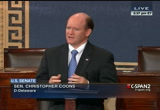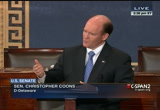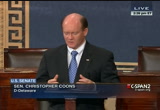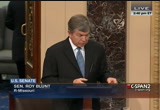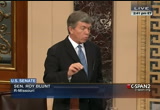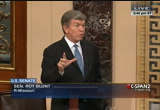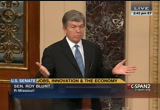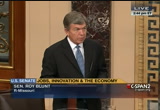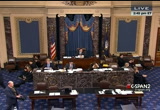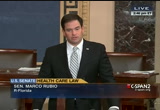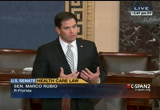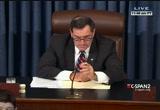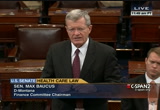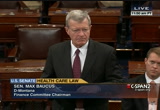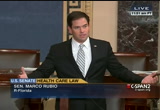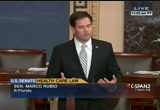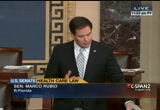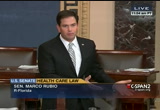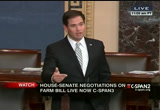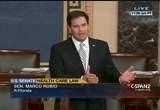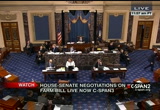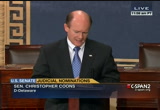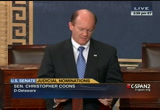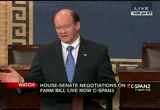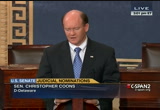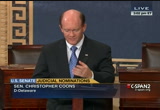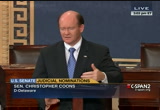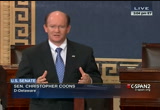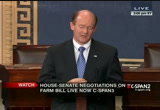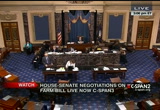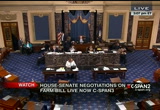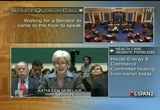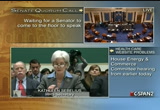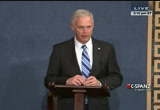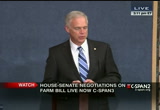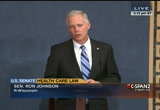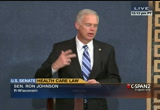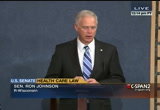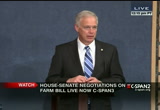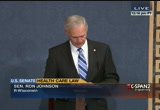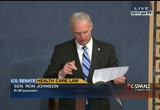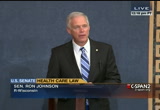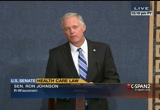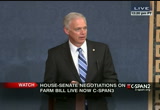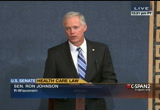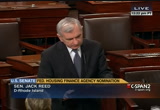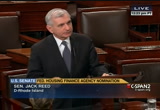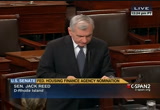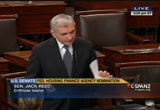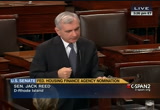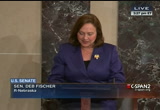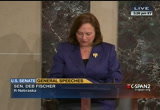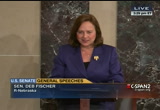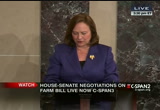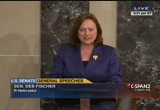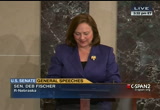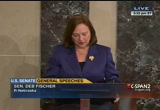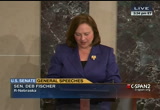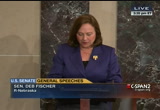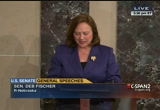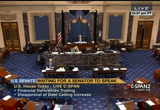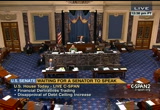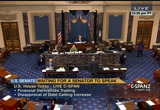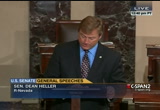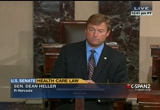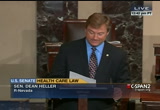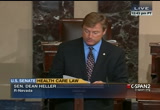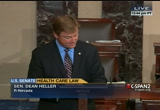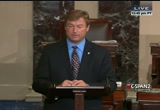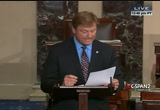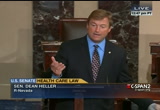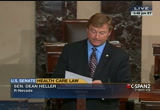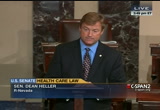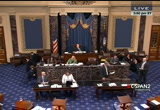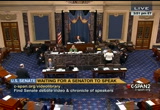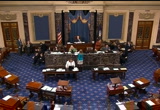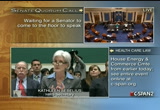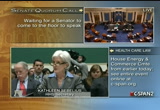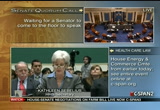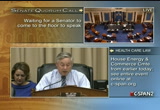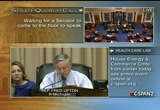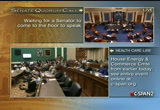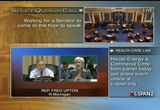tv Key Capitol Hill Hearings CSPAN October 30, 2013 2:00pm-4:01pm EDT
2:00 pm
former solicitors general who served under democrat and republican presidents alike. so clearly there can be no question she has the experience and ability to sit on the federal beth. he -- on the federal bench. she has the support of the national women's law center, the women's bar association and the national congress of american indians. ms. millett is well-qualified and we should confirm her now. one justification -- and i don't think it is a good one -- but the only justification i've heard is not about her at all, madam president. it's about the d.c. circuit, some of my colleagues think that they should remain with three openings on their bench. i don't think this argument squares with the facts. currently three of the 11 seats on the d.c. circuit are empty, and according to the administrative office of the courts, seniors judges, judges who are partially retired, are now involved in over 40% of the
2:01 pm
cases that are decided on the merits. before he was our supreme court justice, john roberts was confirmed to sit on the d.c. circuit. ten years ago, when chief justice roberts was confirmed to sit on that circuit, the average judge on that court had only 125 pending cases. today, with three vacancies on the court, that number is 185 cases. those are the complex cases that are pending. even if we fill all the empty slots, the judges on the d.c. circuit will still have more pending cases on average than john roberts did when we confirmed him to sit on the d.c. circuit back in 2003. so there are no excuses here. we have a finally qualified nominee. 32 supreme court arguments, support of the nonpartisan group that looks at these nominations, someone whose spouse served in the military for 22 years,
2:02 pm
someone who raised her kids while he was over in kuwait. and we are going to turn her down? madam president, that makes no sense to me at all. and i really urge my colleagues to help patty millet to get into this job to do what she says is the highest honor you can have and that is public service. she should be confirmed without delay. the senate should confirm her this week. we heard that the american people -- we all heard this when we were home -- are sick and tired of this kind of delay and partisanship. she is a fine, highly-qualified nominee. she should get an up-or-down vote. on that, mr. president, i've completed my remarks. thank you. and i yield the floor.
2:03 pm
a senator: mr. president? the presiding officer: the senator from south dakota. mr. johnson: i rise to speak in support of congressman mel watt to serve as director of the federal housing finance agency. it has been over five years since the fhfa's inception and it still has never had a confirmed director. first, senate republicans blocked president obama's original nominee for the post, jewel smith, who was a technocrat. today they are trying to block congressman watt because they say he is a politician and not a technocrat. whabut they forget that congresn watt has over 40 years of experience in housing, real estate, and other financial services issues.
2:04 pm
before coming to congress, he practiced business and economic development law and personally walked hundreds of families through real estate closings. in congress, he had served on the house financial services committee for the past 21 years. in that capacity, was one of the first members to recognize the need for action on predatory lending. with quite foresight, he introduced the "prohibit predatory lending act" in 2004 and introduced it every congress until it became the foundation for the "qualifie qualified more provision for the wall street reform and consumer protection act of 2010.
2:05 pm
if he at all listened to congressman watt before the housing crisis, then thousands of consumers might have avoided being scammed into unsafe mortgages that ultimately led to foreclosure. congressman watt has also shown a commitment to housing finance reform. in 2007, he partnered with congressman frank and introduced a bill to reform freddie and fannie. the bill -- this bill eventually led to the housing and economic recovery act which established the fhfa. industry groups, consumer advocates as well as members of congress have recognized congressman watt's impressive track record and support him for this position.
2:06 pm
one of his home state senators and a republican senator who probably knows him best has supported his nomination from the beginning. shortly after congressman watt's nomination was announced, senator burr stated -- quote -- "having served with mel, i know of his commitment to sustainable federal housing programs and am confident he will work hard to protect taxpayers from future exposure to fannie mae and freddie mac. i look forward to working with representative watt in his new role to find new ways to facilitate more private-sector involvement in the housing and mortgage markets." recently, the national association of home builders sent a letter in support of
2:07 pm
congressman watt's nomination, stating, "during representative watt's tenure on the house financial services committee, he has proven to be a thoughtful leader on housing policy. the fhfa needs a permanent director with his leadership capabilities." the national association of realtors has also sent a letter of support praising congressman watt by stating "the director of the fhfa must weigh the cost of action and inaction with the benefits of protecting the taxpayer and ensuring that the housing sector can stabilize and grow. mr. watt has the experience and skill necessary to ensure that both are handled in a manner that will benefit our nation." it is time that we finally confirm a director for the fhfa
2:08 pm
to ensure stability and confidence on the housing market. congressman watt has the experience, intellect, and temperament to succeed as the director and there is no legitimate reason why congressman watt should not be confirmed. at a minimum, as a sitting member of congress, he deserves the courtesy of an up-or-down vote. i urge my colleagues to vote "yes" on the motion to invoke cloture so that we can proceed to an up-or-down vote on congressman watt's nomination. i yield the floor. a senator: mr. president? the presiding officer: the senator from tennessee. mr. alexander: thanks, mr. president. mr. president, the majority leader says that it's time to cut off debate and vote on the president's nominees to fill three vacancies on the district of columbia court of appeals. i will not vote to end debate now because i think such a vote would be premature.
2:09 pm
before the senate has an up-and-down vote on the three judges, there's something else we ought to do first. we should first consider the bipartisan proposal that was made 10 years ago to have the right number of judges on this federal appellate court. for more than a decade, senators of both parties have argued that this court has more judges than it needs and that other federal appellate courts have too few. in 2003, 2005, 2007, with a republican president in the white house, republican senators sessions and grassley introduced legislation to reduce the number of seats on the d.c. circuit. in 2006, they were joined by a distinguished group of eight judiciary committee democrats who include -- who made the same argument. these included the chairman, senator leahy; senator schumer, senator feingold, senator kennedy, senator feinstein, senator durbin, senator kohl,
2:10 pm
senator biden. so when president bush nominated peter cas keisler to the d.c. circuit, the democrats wrote the chairman a strong letter. let me read from the letter. >> we believe that mr. keisler should under no circumstances be considered," the democratic senators said, "much less confirmed by this committee before we first address the very need for that judgeship and deal with the genuine judicial emergencies by the judicial conference." the democratic senators argued, "first, the committee should, before turning to the nomination itself, hold a hearing on the necessity of filling the 11th seat on the d.c. circuit to which mr. keisler has been nominated." they cited a number of objections by senators to the need for more judges on that circuit. then they argued -- this was six years ago -- that since these emphatic objections were raised in 1997 by every relevant
2:11 pm
benchmark, the caseload for that circuit has dropped further. only after we reassess the need to fill this seat and tend to judicial emergencies should we hold a hearing on mr. keisler's nomination." that was the democratic senators' position in 2007. now, these distinguished democratic senators were not only forceful in 2006 and 2007, they were persuasive. they worked with president bush and congress agreed to reduce the d.c. circuit by one seat and add it to the ninth circuit, where the caseload was 526 filings per judge, well above the caseload average for all the judicial circuits. senators feinstein, a democrat, senator kyl, a republican, wro wrote -- quote -- "it makes sense to take a judgeship from where it is needed the least and transfer it to where it is needed the most." senator feinstein, senator kyl
2:12 pm
writing in 2007. mr. keisler, by the way, was never confirmed. for 2 1/2 years his nomination was held in the judiciary committee, from june 2006 until january 2009. now, mr. president, the same arguments made in 2006 and 2007 should be persuasive today. today the average caseload for the circuit, the d.c. circuit, even if it were reduced by three judgeships to the eight seats currently occupied, would be less than one-half the national average for circuit courts. the national average is 344 cases filed per judge this year in federal appellate courts. the d.c. circuit average, if it were reduced to the eight current judges, would be 149 per year. national average, 344 cases per year. d.c. circuit average, even if it's reduced to eight, would be
2:13 pm
149 per year, less than half. since 2005, there's been a decrease of 27% in the number of written decisions by an active judge on the d.c. circuit. since 2005, the number of appeals filed in the d.c. circuit has fallen by 17.5%. so before it considers any of the president's nominees for the d.c. circuit, the senate should do in 2013 today what republican president bush and the democratic senate did in 2007 -- first, consider the appropriate number of judges for the d.c. circuit and then, as senator kyl and senator feinstein wrote, take a judgeship from where it is needed least and transfer it to where it is needed most. i've heard the argument that the cases in the d.c. circuit are more complex than in another circuit and, therefore, the
2:14 pm
caseload ought to be lighter. well, with eight judges, it will be a lot lighter, half the national average for circuit courts. that ought to allow plenty of time to write decisions in complex cases. and other circuits have complex cases as well. for example, the second circuit, including new york, regularly handles many of the most complex cases that come to the federal courts. and finally, there are a number of senior judges who are active in the d.c. circuit. that's true in almost all the circuits. that's part of the way our system works today. they can carry some of the workload when that becomes necessary. but i think it is striking that even if this court only has eight seats, that the average caseload is less than half of the national average. so why does it need three additional judges? that's the question that democratic senators asked in 2007 and that the senate addressed and that president
2:15 pm
bush addressed, and that's the question we should be asking today before we fill anymore seats for an underworked circuit court. so i'll not vote to end the debate on the president's nominees until the senate does in 2013 what democratic senators suggested and the senate did in 2007 -- assess the need for judges on the d.c. circuit and transfer judges from where they're needed least to where they're needed most. that meanst on the president's three nominees, the judiciary committee and the full senate should consider senator grassley's legislation that would transfer one judge to the overworked second and 11th circuits and eliminate one judge. leaving the d.c. circuit with a caseload still that is less than half the national average for the eight remaining judgeships. then if there still are vacancies to be filled with the d.c. circuit, the senate can consider them one by one.
2:16 pm
now, mr. president, the senate has treated president obama very well in considering his nominations. according to the congressional research service, as of august of this year, president obama's cabinet members were on average 54 days, moving from announcement to confirmation in about the -- at about the same pace as those of president bush and president clinton. as far as president obama's judicial nominees, president obama's has had 38 article 3 judges confirmed at this point in his second term, nigeria circuit judges, 25 district judges, four judges to other article 3 courts. by comparison to those 38, president george bush had 16 article 3 judges confirmed. seven circuit judges, seven district judges, two judges to other article 2 courts. what about a waiting list of judges who are waiting to be confirmed by the senate? is there a big backlog?
2:17 pm
9 answer is no, mr. president. as of today, only two circuit judges have been reported by the committee and await floor action. remember, the committee's controlled by democrats. they can report whomever they want. both of these are for the d.c. circuit and are not judicial emergencies. and only seven district court nominations await floor action. none have been waiting long. three were reported in august, four were reported in september. so while there are always a few nominations that provoke controversy and take a while to consider, one of the senate's most important and best-known powers is the constitutional authority to advise and consent on presidential nominations. that's a part of the checks and balances that our founders set up so that we didn't have a king, we didn't have a tyranny, we made it slower, we made -- we gave the president the right to nominate but the senate has the
2:18 pm
right to advise and consent. sometimes that takes a while. sometimes those nominees are rejected. i believe and have argued consistently that with rare exceptions, presidential nominations deserve an up-or-down vote after an poapt time for consideration. president obama's -- after an appropriate time for consideration. president obama's nominations have been receiving timely up-or-down votes. but first as senators from both political parties have argued for ten years, we should make certain that we have the right number of judges on the court. we don't have money to waste in this country with the debt that we have got today. we should transfer judges from where they are not needed least -- from where they are needed least to where they are needed the most. that's the sensible thing to do. and the president's nominees for the d.c. circuit will receive up-or-down votes insofar as i am concerned unless there are exceptional circumstances. now, mr. president, i'd like to
2:19 pm
ask unanimous consent to include in the record the letter of july july 27, 2006, from eight democratic senators to chairman arlen specter suggesting that the hearing on mr. keisler be postponed until the senate had considered the number of judges on the d.c. circuit. and i would like in addition to include additional views of senator feinstein and kyl that were written at that time. the presiding officer: without objection. mr. alexander: and, mr. president, i have one other statement i would like to make. i see the senator from missouri waiting. i would like to -- i will include most of this in the record, but i would like to begin it because it is an important day and an important statement, because it is a remembrance of nuclear weapons workers, particularly in tennessee in the oak ridge area.
2:20 pm
i come to the floor today to give thanks and show respect to the world war ii and cold war heroes who served in our nation's nuclear weapons program on this fifth national day of remembrance. they weren't serving in the heat of battle, but in the laboratory, handling materials on a daily basis that ranged from benign to toxic and highly radioactive. these materials posed risks that many scientists did not understand at the time. today in oak ridge, tennessee, the american museum of science and energy and cold war patriots are gathering to celebrate former workers and view a quilt that honors workers safety. this one of a kind remembrance quilt has 1,250 commemorative handwritten quilt squares that form an american flag that measures 17 feet by 11 feet. i want to specifically remember bill wilcox for his service to our country and passion in
2:21 pm
preserving oak ridge history. bill passed away this summer. he was a former manager of the k-25 operations, a manhattan project veteran and the official historian for the city of oak ridge. in 1943, bill was hired by tennessee eastman on a secret, secret, secret project in an unknown location. when he started at eastman, he was told as chemist, you will have to know that you will be working on this project with a substance called uranium. that's the last time you will hear that word or that you will speak it until after the war. and if you are ever heard speaking the word, you will be subject to discharge from our employment immediately and very likely prosecuted by the united states government and may end up in jail, is that clear? in oak ridge, the ground broke for the y-12 plant in february, 1943. by the end of the summer, they started installing the calutron machines, complex physics machines. about 1,000 of these machines
2:22 pm
were installed at y-12. how were they operated? tennessee eastman said the calutrons couldn't be run as an experiment. it should be run like an industrial plant rather than manuals. there should be a simple red line on meter e, on meter a the operator would turn the knob a until the meter is on red line on meter a. mr. president, i would like to include in the record the remainder of my statement on this day of remembrance for nuclear weapons workers. i ask consent to do that, and i yield the floor. the presiding officer: without objection. a senator: mr. president? the presiding officer: the senator from missouri. mr. blunt: mr. president, i would ask unanimous consent to enter into a colloquy with my colleagues from delaware and ohio for up to 30 minutes. the presiding officer: without objection. mr. blunt: mr. president, i will just say we're going to be talking about something here. it's one of those rare, all too
2:23 pm
rare occasions anymore where we all agree, and it's about making things. we want to talk for the next few minutes about what happens in our country, what needs to happen so that we can not just make things again because we still make lots of things and we make them very well, but what do we need to do to be able to make more things, what do we need to do to be able to be sure that we're at the competitive front of the line as we work to make things. all of us are working on things together. senator brown and i have been working on advanced manufacturing. it's something he has talked about, we have talked about together. he has been a leader on for a long time, and all of our states benefit. missouri and ohio have certainly been among the significant manufacturing states. in missouri, we have more than $32 billion a year in manufacturing. for about the last four years, that's been the top
2:24 pm
manufacturing employer has been in the agricultural industry and food processing, but transportation equipment, fabricated metals, machinery of all kinds every automobiles have been in the top of our manufacturing sectors, but i think we're really at a point where so many things could easily come together and the federal government and the congress can help to make those things together by taking down barriers, by creating easier ways to work together and in the case of advanced manufacturing, this is something, the centers of excellence that we have talked about, we have worked on, we have both seen some of these work, and i'd just reich to -- like ask senator brown some of the things he has seen and some things we can better do by the legislation we have been talking about. mr. brown: thank you, and i appreciate the senator blunt yielding as i do the colloquy with senator coons, both of whom have been leaders in manufacturing in missouri and in delaware. it's pretty clear what these public-private hubs can do in
2:25 pm
terms of a multiplier effect. if you look at manufacturing history in this country -- and of course i would use an illustration of my state and understand my state better than i do any other, but when akron was a tire manufacturer, was the leading -- was the center for tire manufacturing, along the ohio turnpike in northeast ohio from toledo where glass manufacturing was -- was some of the leading -- was prominent and prevalent for decades to autos in cleveland to steel and then to rubber in akron, you can see that once you have a sort of innovative focus, then other kinds of manufacturing comes out of that. akron now went from as the tire industry declined over the decades now is one of the leaders in polymer. toledo, which was a leader in glass manufacturing, plate glass for cars, bottles, a lot of other kinds of glass wear,
2:26 pm
toledo has become a solar center. and so what are -- the legislation senator blunt and i have come up with will, i think, help american workers and american business have the drive and the creative thinking and the determination to outinnovate the rest of the world. before turning to senator coons, i'd like to just tell a quick story that tells me why it's so important that manufacturing take place here. we still -- we outinnovate the rest of the world. we're the most creative, we're the best innovators, we lead in foundational research and other kinds of research. the problem is as we invent things in this country, if those -- if we then outsource the manufacturing, so much of the creativity and innovation, both in process and in product take place in that other country because it takes place in the shops. giver you an example -- give you an example. the largest yogurt manufacturer
2:27 pm
in the united states is in ohio. i was there one day. they used to bring in the supplier -- suppliers would send the plastic cups to the -- to the shop floor, to the manufacturer, and over the big silver vats, they would fill the plastic cups with fermented milk, package it and send it. a young industrial engineer, a couple of people who worked on the line for years said we can do this a lot less expensively and same money for the company, be more productive and efficient. he developed, they developed, the three of them something pretty simple to an engineer, not so simple perhaps to me, but simply they fed -- they fed a roll of plastic in, a sheet of plastic, and it was slowly heated, it was then extruded, then cooled, then filled with yogurt. the line was about 75 feet, and it saved -- made for a much more efficient operation. that innovation took place on the shop floor of an american -- an american manufacturing plant,
2:28 pm
making the productivity of that plant much, much greater. that's really how we need to look at this, in my view. if we're going to do this partnership with government and local manufacturers and local labor unions and local businesses and suppliers, we can do the kinds of work that senator blunt mentioned with these -- with these manufacturing hub, this network of manufacturing innovation initiative that we have had. we introduced a bill this summer. we're working to build support. we welcome our -- our colleagues in support of it. and if either of you want to tell us, senator coons and senator blunt has already mentioned what it would mean to missouri, what it would mean to delaware, what it would mean to this country, what better manufacturing, more innovation means to this country. so i thank my two colleagues. i have a conference committee with agriculture i need to join, but i appreciate very much your opening this up. mr. coons: thank you very much, senator brown, and thank you for
2:29 pm
your tireless and engaged leadership on manufacturing, on fighting for access to foreign markets on fair terms, for fighting for skills and increasing the skills of our manufacturing work force, and in this instance in this strong bipartisan bill in working with our colleague from missouri on a national network of manufacturing innovation centers. my own work eight years in a manufacturing company in delaware in a materials-based science company that makes things helped make it clear to me how important research and development continuous innovation is for manufacturers at all levels, and i have seen this across the state of delaware, and our presiding officer, long owner and leader in manufacturing a business in his home state of indiana knows this better than any of us, that if you don't innovate, if you don't invest in research and development, in improving the skills of the work force and improving the productivity and the operating efficiency of any manufacturing company, you can't survive in the tough headwinds of the global marketplace today.
2:30 pm
one of the programs that i championed here in the senate and that has bipartisan support is the manufacturing extension partnership. it's a long-established program that takes the latest cutting edge research and development work at universities and moves it to the shop floor. i have visited companies up and down delaware from f.m.c. in newark and speakman in new castle to miller metals in bridgeville and baltimore air coil in milford where they have taken those innovations from the university to the shop floor. one of the things i'm grateful to senator blunt for is his leadership in taking that insight that in order to have the most productive manufacturing work force in the world, in order to continue to complete globally we have to find ways to continue to invest in demonstrating the power of innovation and we have to find ways to do that in a bipartisan way. so senator blunt, i just wanted to thank you for being willing to work with senator brown and with others here. this is exactly the sort of stuff that i hear from delawarans they want us to be
2:31 pm
doing, there's lots that divides us, this is nothing something that unites us. working together to strengthen our manufacturing sector, to bring jobs back to the united states and grow this sector. we've grown half a million jobs in the manufacturing sector. these are good jobs at high benefits, high skills but we can and should do more pulling together to lift further this ongoing manufacturing revival. senator blunt if you'd share more about this specific bill and about your experience in what else we can and should be doing together to strengthen manufacturing in missouri, i'd be grateful. mr. blunt: senator coons, i'd like to say your point is well made. these manufacturing jobs are good jobs. the american work force is competitive. as senator brown said we've always been on the cutting edge, the outside of competition, making things in a better way than we did last year. everybody that's competing today is trying to figure out how they can do whatever they did last year better and we see that and
2:32 pm
what we can add to that, how you can make that process work better. in our state, the average manufacturing job pays 21.5% more than the average wage. so 21.5%, that's $52,000 or so that's the average manufacturing job in missouri is a significant improvement in where you might otherwise be. we have 6,500 manufacturing firms, almost a quarter of a million people work in manufacturing, and we used to have more than that. we used to have more than that and i think we'll have more than that again. the country used to do more in terms of manufacturing than it does now but we're going to see that happen, you just wrote an article in "congressional quarterly" that talked about the things that need to be done, the great opportunities we have in energy, take of those energy opportunities, suddenly the utility bill is more
2:33 pm
predictable, the delivery system is more guaranteed. i was talking to a manufacturer in my office and this topic came up, at some point as you get further and further into innovation, people not only have to be better trained, talked about that, the importance of the skilled work force but the work force, how the work force competes with maybe a lower paid work force in some other country maybe not nearly as important as how the utility bill competes. if you can run that facility and i just gave him an example of another manufacturing facility in my hometown in springfield, missouri, making a significant expansion. i think about $150 million expansion, but they didn't expect to hire more people but expect to use that current work force in a much more competitive way. nobody was losing a job because of advanced competition. they're just expanding that work
2:34 pm
force in a way that ensures they'll keep their job, be more fef exef, somebody, by the way, is building that expansion, there are jobs there as well and those all matter. we have all kinds of examples, perryville, missouri is a town of less than 10,000 people who live there. and in that town they really it's become a hub, about 80 miles south of st. louis, a hub of 21st century manufacturing. so a japanese company is there, toyota gosei that makes plastic components for automobiles, sabre liner makes aviation parts, gill strom mary lee a more traditional employer. but a town with a significant manufacturing jobs, castville near springfield for a number of years had more manufacturing jobs than they had population. now, of course, that meant in the part of the country where i
2:35 pm
live lots of people may have been driving significant number of mimes to get to those jobs but there is a smaller community, a county seat of berry county but more manufacturing jobs than people that lived in the community itself meant that that's a competitive community. that's a community that knows how to build jobs. perryville is a community that's really launched itself well into the 21st century, and the skills you were talking about, the skilled work force, the energy needs, the research component. one of the components of these hubs of excellence that we've been talking about, senator brown and i have been working on, is to create ways to encourage higher education to be part of that. to encourage higher education to be part of that research component. and i think americans are eager to make things again. i'll bet you and i both hear the
2:36 pm
same thing over and over again, how can we have a strong economy if we don't make things? you know, you can have a strong economy, parts of the economy that don't make things but not only do you need to make things but there's something that really defines who we are in a positive way when people see americans making things that not only are heavily competitive here but are competitive all over the world and i think that's the kind of thing, senator coons, you and i are talking about, the bipartisan effort we need to make. i don't know any republicans or any democrats anywhere or any independents who said we don't need to worry about making things, don't want need to worry about a competitive economy. actually private-sector jobs should be the number-one domestic goal of the federal government today and the jobs we're talking about are a significant component of that because they lead to lots of other jobs. all of the ripple effect of manufacturing jobs is great,
2:37 pm
the other businesses that spring up, the suppliers that come and, of course, your state, your family, i know your father and you and i have fawkd about that was a significant part of launching new things into the marketplace. and so i think that's the kind of thing you and i want to see this congress encourage as we we can encourage things without law and look for legislative ways to facilitate growth back toward manufacturing. mr. coons: thank you, senator blunt, for your work on this bill with senator brown. there are other bills that i hope this body will take up and discuss and debate and where i hope we can find ideas that are out there, progress that's being made, policy innovation that's being made and that we can take them up, debate them and find bipartisan sponsors who will carry them forward. i absolutely agree we're seeing a manufacturing revival in this country for a variety of countries, one is less
2:38 pm
expensive energy, the shale gas revolution is reducing the energy costs broadly for manufacturing of all kinds. we're also seeing that lots of american companies fear the loss of their inventions, innovations if they move offshore so some of the attractiveness of operating in other countries has dimmed a bit as they've recognized that the united states is one that has a rule of law that protects their inventions and innovations. there's also less of a wage gap as wages have come up in the developing world, in china, the wage gap is less so that combination gives us a window, a moment of opportunity. we lost millions of manufacturing jobs in the first years of this century but we've been growing them steadily. if we can work on manufacturing skills, on access to credit, on innovation, on a coordinated strategy, i can't imagine a community in this country that wouldn't rather have high
2:39 pm
quality manufacturing jobs. senator blunt as you were mentioning for every manufacturing jobs that's created there's 1.6 new support jobs created, for every dollar spent in manufacturing there's $1.34 spent in the local economy. it is the sector that has the most positive secondary impact in our communities at home. i do think that there's broadly in our country a sense we've lost our leading edge in manufacturing because of the large-scale layoffs and the large plants closing but in my state and i presume in yours and indiana and others there are differential of small mftion who are growing and -- manufactures who are growing and want us to facilitate their access to innovation and access teeks a skilled work force. if we can pull together around this we can do great things for the united states going forward. before we close senator blunt i want to thank you for being a cosponsor of the start-up innovation tax credit,
2:40 pm
something senator rubio and senator schumer and stabenow as well as senator moran have cosponsored and introduced and discussed over time. it would help with access to capital for early stage start-up manufacturers. there are a lot of things we can discuss going forward but for today i am grateful for your leadership with senator brown on this bill that would help strengthen the national network of manufacturing innovation centers. you are a strong leader for manufacturing in your home state of missouri, and i'm grateful for a chance to spend some time with you on the floor today discussing that good bill and your good ideas. mr. blunt: let me talk about the start-up act we've worked on, i think you mentioned all the cosponsors of that, senator rubio, senator stabenow, senator mccain, senator schumer and enzi and what that does is try to extend the opportunity of research and development to start-up businesses. the way the tax credit works if
2:41 pm
you're -- you can deduct those costs from the taxes you pay but if you're a start-up business you often don't have any profit to deduct from. that's part of the courage of starting a business. you're almost ensured, guaranteed that for the first weeks, months, sometimes the first -- the first years depending on how big a eventure this is, you're not making money yet. so what you and i and our friends frendz have done in the start-up act is say these people would have employees and so what we do is allow the same tax credit for a big corporation or a big business or a highly successful business with lots of profit, we allow that same tax credit to be applied against what they pay as taxes on their -- for their employees, the social security tax, the other taxes that are paid and, again, trying to encourage innovation. we all know that small business is the engine that drives the
2:42 pm
country but also can be the small business that drives -- can be the engine that drives manufacturing if we figure out a way to let them have some of the same benefits that existing businesses have that have already gotten themselves in a profitmaking situation. this gives them a place to go and utilize that credit and that's the kind of thing we ought to be looking at, start-up businesses are important, encouraging traditional businesses to figure out how to upgrade their equipment, upgrade the way they do things so they're more competitive in an international marketplace. i believe for reasons you mentioned, the wage gap is not what it was, the tption costs are more than they were to get nothing something made from somewhere else back to the greatest market in the world, the united states of america and the more we know about the utility bills, senator from
2:43 pm
indiana and i have been working on things that pay attention to the utility bill. that's a key component of future manufacturing. the more competitive you are, the more innovative you are, the more likely you're to be concerned about that part of your input costs. and sometimes when you spanned the ewe -- expand the utility bill is bigger than the additional labor cost. but that may be what ensures you can keep the labor you have and grow that labor by being able to make a commitment that you feel good about because you feel good about your ability to run that facility once you build it. you feel good not only is it going to work this year but, by the way, we're doing so well and doing so many things that ten years from now we feel like that whatever the utility costs are going to be they're going to be within the range that we can deal with and still make things right in missouri, right in ohio, right in delaware or indiana, and that's the kind of
2:44 pm
things we ought to be focusing on. how do we make things again, create other kinds of private-sector jobs, the number-one domestic priority of the country today and every time you and i talk about manufacturing, i really do get excited about an america that is thinking about not only are we going to be able to continue to make what we've always made but what can we make better than anybody else that we're not making yet that's going to allow us to be out there in a world marketplace, trade has become a much greater opportunity for the american work force as all of these other factors that we've been talking about on the floor have come together to make our work force what it is. if you have any final remarks, senator coons, i'd like you to finish up our time here on the floor. mr. coons: thank you senator blunt for your enthusiasm for manufacturing and for your enthusiasm for working together with me on the start-up innovation credit bill as you referenced and with senator
2:45 pm
brown on the national network of manufacturing innovation centers as he spoke about. manufacturing really is the center, the beating heart of the middle class of america. manufacturing jobs are good jobs. weendz to get back to being a country where inventing things, growing things, making things in this country is an pear of bipartisan sustained -- area of bipartisan sustained purpose. i know for the folks who watch at home and in this chamber, nothing nog could meet the demands and needs of our communities and states more than for us to come together in a bipartisan, balanced and responsible way to advocate for a stronger manufacturing sector here in the united states. thank you very much and with that, mr. president, i yield the floor.
2:46 pm
a senator: mr. president? the presiding officer: the senator from florida. mr. rubio: thank you, mr. president. i think we've all now been aware over the last few days in the news about the problems being faced with the web site upon which people are supposed to go to in order to sign up to be on one of these exchanges. that's important because next year americans are going to owe money to the i.r.s. if they don't have health insurance by a date certain. one of the ways people are supposed to get health insurance is by going on to one of these sites, logging on, registering and signing up. if you don't do that you're going to owe money to the i.r.s. next year. the problem is that those web sites aren't working. in fact, just today as the secretary was testifying before a house committee, the web site
2:47 pm
crashed again. now, there are a lot of different reasons why that's happening and i'm sure eventually with all the experts involved in it, eventually they'll be able to set up a web site that functions because this is the 21st century. the ability to go on line and buy something is something people do all day with all kinds of things and to me it is inexplicable they're not able to do that when it comes to health insurance. in the meantime people are struggling not just with the web site, the problem is with the 800 number and paper applications. so i believe the prudent approach is to say we're going to delay, we're going to put off punishing people, put off this individual mandate until the web site works. i will admit, i don't think it will work at all in its totality and will eventually have to be repealed. but in the interim what i'm proposing is something i think is pretty reasonable and that is the notion that until these web sites are working, how can we punish people for not buying health insurance?
2:48 pm
how are we going to punish someone for not buying health insurance if the web site they're supposed to buy it on, by the administration's own admission, is not properly working, and this is creating a lot of aeupbg anxiety for peopl. that is why i filed a bill to do that. that is why i have come to the floor today, the purposes of making a motion, mr. president. as in legislative session, i ask unanimous consent the senate proceed to the immediate consideration of calendar number 225, senate bill 1592, which is a bill to delay the individual mandate until the health exchanges are functioning properly. and i further ask as part of this request consent that the bill be read a third time and passed, that the motion to reconsider be considered made and laid upon the table. a senator: mr. president? the presiding officer: is there objection? mr. baucus: mr. president? the presiding officer: the senator from montana. mr. baucus: mr. president, reserving the right to object, i think it's pretty clear that this motion is inappropriate. this is not what we should be
2:49 pm
doing or how we should potentially change the act. actually the effect here is to disrupt implementation of the affordable care act. the affordable care act is a law. it's been in place for so many years. the supreme court upheld it. attempts to repeal it failed. i think the house voted up to 20 times to try to repeal. they all failed. the act's here. so the goal here is to make it work, make the act work, and then later on ask questions about what happened, why did it not work? why was implementation, that is of the exchanges, not as good as a lot of us would like it to have been and find out who is responsible. right now it works. the effect of this motion is severalfold. one, it will deny people from having health insurance, people
2:50 pm
who otherwise would get health insurance. we delay this, the individual responsibility requirement, it is going to cause a delay and people will not have insurance. second, it's going to increase the cost of health insurance for a lot of people. why? because fewer people will be signed up. the individual responsibility requirement will not be followed as much as otherwise would be the case. the result is that fewer people will be in the insurance pool and, therefore, prices will be higher. another consequence, it lowers the quality of health insurance, especially for those individuals who are seeking to be insured. they are going to have a lower-quality product as a consequence of this request. it destabilizes -- it is an attempt to destabilize, an attempt to undermine the a.c.a.. i think for those reasons, it's inappropriate and, again, it is another effort to obstruct. we should not proceed this way.
2:51 pm
so i object. the presiding officer: objection is heard. mr. rubio: mr. president? the presiding officer: the senator from florida. mr. rubio: mr. president, i don't intend to offer another motion since the objection's been heard. i do want to point out a couple things. first of all, this notion that obamacare is the law. it's true it is the law. it was passed by congress in the years before i got here. this is called the calendar of business. this is the executive calendar. basically every single bill that's in here is an effort to change existing law for the most part. that's what we do around here. that's what the legislative process is about. virtually every bill that is filed is either an effort to create a new law, but usually it is an effort to change existing law. if we begin to argue around here that once something is existing law it can never be changed, we might as well close up shop because that's what we do. that's what the legislative process is about. the second point that was made is that this law will prevent people from having health insurance. that is not true. let me say this.
2:52 pm
number one, i am in favor of people having health insurance, and i do think that we cannot ignore the health insurance problem that this country faces. number two, admittedly, i am in favor of repealing obamacare and replacing it with a better alternative. but that's not what this bill does. all this bill says, this is the only thing it says, the only thing it says is that you can not enforce the individual mandate, that you cannot tell people next year that we will find you, that the i.r.s. is going to impose a fine on you. you will not be able to do that until the web site is fully working. in terms of this preventing people from getting health insurance, that's simply not accurate. this doesn't prevent anyone from going on to the web site and signing up. the bill that i am proposing is adopted, it wouldn't keep anybody from signing up for health insurance under obamacare. the only thing it would keep is the i.r.s. from fining you if you're unable to do it. and the reason why that makes sense is because the way we're supposed to do it on a web site simply isn't working.
2:53 pm
so it's just not accurate to say that this will somehow prevent people from buying health insurance. it doesn't. it doesn't prohibit you from trying to get it on the web site. it's just a recognition that the web site is not working well and there's a consequence to it. the consequence to it is if they can't get these web sites up and running, there are people that will not be able to buy health insurance, and they're going to get fined for it. that doesn't sound fair to me. so while i continue to want to repeal obamacare, i think for the good of our people, it's unfair to continue to hold over the head the threat of an i.r.s. fine when the method of compliance that we're asking them to follow isn't fully functioning. and that's all that this would do. and i would point out that this is not a theoretical concern. i want i get letters and e-mails every day. i want to read one that i got, and i'll paraphrase it. it's from barbara in russkin, florida. she is 63 years old. she tried to apply to the health insurance marketplace on october
2:54 pm
1. as of the writing of this e-mail, she's no further along. she sought the services of a certified navigator on the 14th of october after spending hours online trying to get an account established and making the application, the navigator with her on speaker phone after many hours finally assisted her in making an application. she was told that she would receive additional information via e-mail. ten days later she had still heard nothing. she's worried because she's currently covered, but that is being terminated at the end of the year because of obamacare. it's going to end on the 31st, and according to the information provided to her, she has to be enrolled in another insurance plan or she's going to face the fine. this is one example. i could go on and on. i don't want to burden the time of the senate, but there are thousands upon thousands of people that are dealing with this problem. here's the last point i would make. i have now heard on a number of occasions the administration say that, with full confidence that by the end of this coming month, by the end of november the web
2:55 pm
sites will be up and running. if that is true, if that's true, there is no reason to be against my bill. if in fact you are so confident that the web sites are going to be up and running by the end of november, this problem will be taken care of. if in fact you are right and the web sites are going to be up and running by the end of november, then the mandate will be back in effect. the only thing my bill does is says as long as the web site is not working and until it is working, you cannot enforce the obamacare mandates on people through a fine from the i.r.s.. that's it. that's all it says. and that's why i think this makes all the sense in the world. and i am surprised that we somehow believe that we should continue to hold the penalty over people's heads when the way that we're asking them to comply with the law by the admission of the administration, by the admission of the secretary today, is simply not working well enough. so i hope in the days to come my colleagues will reconsider, because i think our people
2:56 pm
irrespective of how you feel about obamacare, i think our people deserve better. to that end i would read one e-mail from someone who supports obamacare. nicholas in palm bay, florida, wrote an extensive e-mail. he talked about how he submitted an application through the web site. it took hours to complete because of web issues. they finally finished the application 23 days later. the application is still in progress but it won't let him go any further to choose the insurance. and so while he is -- does not agree with me about defunding obamacare or repealing obamacare, he agrees with me that we should suspend the individual mandate penalty until this web site thing is fixed. so i think there are a lot of people that are going to feel that way and i think there are a lot of people that would be shocked that the government is going to punish them for not buying insurance when the web site that they're being sent to to buy it on doesn't work. and again, i think that is a commonsense approach. i'm surprised that there's objection to it. i suppose i shouldn't be, but i
2:57 pm
am. and i hope that in the days and weeks to come that my colleagues will reconsider, because, in my opinion and i think in the opinion of many americans, it's simply unfair. with that, mr. president, i would suggest the absence of a quorum. the presiding officer: the clerk will call the roll. quorum call:
2:58 pm
the presiding officer: the senator from delaware. mr. coons: is the senate in a quorum call? the presiding officer: it is. mr. coons: i ask unanimous consent that proceedings under the quorum call be vitiated. the presiding officer: without objection. mr. coons: mr. president, i rise today to speak in favor of ms. patricia millett's nomination to the d.c. circuit court. as a member of the senate judiciary committee, i have the opportunity to closely examine each of the judicial candidates nominated by our president. i did so with ms. millett, attending her nomination hearing and speaking to a wide range of the practitioners and colleagues who have direct knowledge of her professionalism and experience. without exception, at every stage of her career and with every personal and professional colleague with whom she's had work experience, patty, ms. millett, has distinguished herself as a person of integrity, intelligence and dedication. she is a person whose capability and devotion to a family is an inspiration to those around her.
2:59 pm
she is unanimously recommended by former living solicitors general and received the a.b.a.'s highest rating. some of my colleagues here have argued that president obama is trying to, quote, pack the court by nominating ms. millett and two other nominees to fill three current vacancies on the d.c. circuit court. these charges of court packing strike me, frankly, as without foundation. court packing is an historical term used to describe when politicians try to change the size of a court, expand a court in order to control its expected outcomes. that was the cause of the objection to president roosevelt's plan, to add up to six justices to the u.s. supreme court back in 1937. this is in fact the opposite. in fact, a current legislative proposal to strip the president's ability to fill three vacant seats on the d.c.
3:00 pm
circuit could better be called court stripping. in this particular case, making nominations to vacant judicial positions is not court packing. it is a president doing his job. and confirming highly qualified nominees to serve on this circuit in this vacancy would be this body doing its job. charges of court packing are be a sudden on their face, i think. they're even more absurd when putting con-- when put in context. ms. millett has been put in the ninth seat of the 11th authorized on this court. i held a hearing earlier this year on judicial staffing levels in my role as the chair of the subcommittee on bankruptcy in the courts of the judiciary committee. i invited the chair of the committee on judicial resources, judge timkovich to come and testify. he was nominated by george w.
3:01 pm
bush to soarch the tenth circuit court of appeals. george timkovic testified that the federal judiciary needs more judges, not fewer. every other year the judicial conference submits to congress a report on recommendations on judgeships that. report did not conclude that any judgeship should be removed or remain unfilled on the d.c. circuit. judge timkovic also explained when the caseload statistics used intoim of our colleagues to argue that the d.c. circuit has a low caseload and, thus, need not have its vacancies filled, are in fact unconvincing. the d.c. circuit in fact hearings hears a unique load with four times the number of complex administrative appeals than other circuit courts arranged the country. the d.c. circuit is the circuit from which all the federal agencies' examples are eapeeled. it's caseload is made up of very complex, very difficult cases
3:02 pm
with far-reaching consequences and that require a great deal of time. so simply looking at the raw number of cases filed, opened, and closed is not an accurate predictor of whether or not a vacant seat on the d.c. circuit should in fact be filled. the d.c. circuit's caseload has in fact remained steady did i over the past ten years so the judicial conference has seen no reason to recommend any alteration in its staffing levels. the court packing argument made by some is also at odds with history, especially when you consider that caseloads lower than they are now on the d.c. circuit were sufficient when all republicans then in office voted to confirm then-judge roberts to the ninth circuit, janice roge rogers. when ms. millett is confirmed, the d.c. circuit will still have more pending appeals per active judge than after the
3:03 pm
confirmations of any of those four earlier bush nominees. the caseload on the d.c. circuit would also remain above that of the current tenth and sixth circuit to which the senate has confirmed judicial appointed nominees this year. in filibuster of ms. millett on caseload grounds would bring the senate to an unprecedented and regrettable place t would destroy comity and trust at a time when our nation needs it bhorks we need to demonstrate to the meme of the united states that this congress can function understand that this senate can fulfill its constitutional role. it would not just facilitate the administration of justice by our courts but also allow us to tackle other issues if we could move past endless and needless filibusters on ires like this, it would allow us to move forward to the broader issues of the day, tackling long-term debt and deficit chacialtion reinvesting in our future,
3:04 pm
working together to grow our commitment of there are so many other issues that call for the time of this body with that, mr. president, i want to urge my colleagues to look at ms. millett's nomination on its merits and not be distracted by what i think are groundless arctics that this is an instance of so-called court packing by this president. this president is doing his job. he is nominating supremely qualified candidates to serve in the highest courts of this land and this body should do its job and confirm those qualified nominees. thank you. mr. president, if i might, i wanted to commend to this body that something passed with little notice here yesterday. october 29 of 2013 was national technological innovation day. this was recognizing the role that technological innovation plays in the united states economy. we know that innovation is absolutely essential to developing new medicines and
3:05 pm
treatments and cures to help us live longer and more healthy lives. the innovation is essential to strengthen the manufacturing sector of the american economy and make us more competitive. innovation is essential to allow us to take advantage of new materials and new opportunities in the world and to access new export markets overseas. innovation overall is the thing that has brought all of what is best about modern life and the modern world. so yesterday in a bipartisan way we recognized the fact that on october 29 many, many years ago was the very first day that darpa net was able to exchange communications from one computer to another. it was literally the dawning of the modern internet aifnlt it was made possible in part by federal investment in innovation. and i was grateful that senators moran and isakson and senator heinrich and kirk joined moo he in recognizing the unique and
3:06 pm
3:10 pm
mr. johnson: mr. president? the presiding officer: the senator from wires which is. john join i ask unanimous consent that the quorum call be dispensed with. the presiding officer: without objection. mr. johnson: mr. president, came to the floor tatted to introduce a piece of legislation which i think is timely and i think very well needed. one of the reasons decide run for the united states senate was the passage of the health care law. the reason i thought it was pretty important is because i said at the time that the passage of the health care law represented the greatest assault on our freedoms in my lifetime. i believe that's true and i believe that's being borne out today. we are witnessing it today. the passage of the health care law resonated with me, made such an impact on myself because my wife and i are beneficiaries of
3:11 pm
the freedom that we had with our current health care system. our first chiecialtiond our daughter c a. rrie, was born with a congenital heart defect. her arteries were reversed. so the first day of life, our daughter was rushed down to the milwaukee children's hospital where a wonderful man dr. john thomas cammed in at 1:30 in the morning and did a procedure and saved her life. eight months later when her heart was the size of a small plum, another team of medical professionals in seven hours of open-heart surgery totally rebaflted the upper chamber he have her heart. her heart operates backwards today. but she's 30 years old, a nurse practitioners practicing at the same hospital in which her life was saved. she just got married about three weeks asmgh ago. our stoir has a happy ending
3:12 pm
dpsh our story has a happy ending. i was able to call up boston children's and chicago children's hospital, talk to the preeminent surgeons in the world, which means in america, and find out what is the most advanced medical treatment, the most advanced surgical technique at the time, and we're able to avail ourselves of that. i have a beautiful daughter who is 30 years old and she is also taking care of babies in a ne neneonatal unit. i decided to to file this legislation today bus as a united states 12340 senator froe state of wisconsin, we have been getting a number of phone calls into our office of wisconsinites that are getting letters of cancellation on their insurance policies. in particular, one couple
3:13 pm
touched my heart, gave me a great deal of cause for concern. this couple who does not want to be identified because they fear i.r.s. retribution, which is a little bit different story, a little off-topic, but i guess is worth pointing out, this couple, they both have cancer. the wife has stage 4 lung cancer. the husband is recovering from prostate cancer, in remission. this couple had availed themselves and are covered under the wisconsin high-risk insurance pool. it is a high-risk pool that works. i know in my business when we had an individual that was lays he shalled off of our -- laserred off of our insurance policy, those individuals were available to aavailable themselves in the sharing of the risk high-risk pool. it works. it is affordable. this couple received their notice of cancellation from the
3:14 pm
high-risk pool and they panicked. they were in a panic. when you have stage 4 lung cancer, the last thing you need is stress. obamacare caused them a great deal of stress. it's causing them a great deal of stress. they tried to get on health care ko-- theytried get on on health. we've done everything we can to help them. they've been had touch with some of the insurance carriers that will be part of the exchange participating in wisconsin. they've gotten quotes. this is prel preliminary, this t fine a urchedz the high-risk pool, their maximum out-of-pocket exposure is about $2,5,000 a year. he's work, got a good job. they can barely atord that. preliminary indications show
3:15 pm
that that expose ire will double to $40,000. the only reason they may remain whole is that they may qualify for a subsidy -- nobody can calculate it yet. think of a gotten three different answers. it's like you take a tax return, 100 different payers and you got 100 different results of what tax is owed. based on the preliminary estimates, it is looking like their total exposure won't be $20,000, it will more like $40er,000. and they are subsidy might come half of that. their health care expense didn't decline, as president obama promised, by $2500 per year. it is going to virtually double. and if it doesn't double, it is because the american taxpayer will be pick up the other half. so one of president obama's primary promises he made, that
3:16 pm
if you pass the health care, the cost of a family plan will decline by $2,500 per year by the end of his first term, that promise has been broken. that was not true. and of course the other very famous promise the president made repeatedly was, if you like your health care plan, you can keep your health care plan. and i'd like to just go through a number of times president obama actually made that statement. looked the american people in the eye trying to sell his health care plan and guaranteed them if they liked their health care plan, they're going to be able to keep it. on march 6, 2009, he said -- this is an exact quote -- "if somebody has insurance they like, they should be able to keep that insurance. if they have a doctor they like, they should be able to keep that doctor." then on may 11, 2009, "americans must have the freedom to keep whatever doctor and health care plan they have." on june 2, 2009, "if they like the coverage they have now, they can keep it.
3:17 pm
it." that was in a letter to senate democrat leaders. on june 11, 2009, president obama said, "americans must have the freedom to keep whatever doctor and health care plan they have." on june 15, 2009, this is probably the most famous one that i remember, president obama in an address to the american medical association said, "if you like your doctor, you'll be able to keep your doctor, peri period." "if you like your health care plan, you'll be able to keep your health care plan, period. no one will take it away no matter what." now, mr. president, i think i've made my point. i've got another one, two, three, four, five, six, seven, eight, nine, 10, 11, 12, 13 other quotes that i could continue to read, basically make the same point, the same promise, the same guarantee. as recently as the beginning of this month, on the white house
3:18 pm
web site, it says, "we've got some good news for you. if you currently have private health insurance, you should be able to deep and that's exactly what the health care law says." now, unfortunately, today over 2 million americans have received cancellation of their insurance policies, the policies they chose, that for just a little time -- a little more time, they have the freedom to choose. they won't have that freedom come january 1. so either one of -- one of two possibilities are true. either president obama was being entirely dishonest to the american public when he made those repeated promises, those repeated guarantees, or he was totally disengaged from the process, did not have a clue what was in his own health care
3:19 pm
plan or did not understand the incredibly negative consequences of that health care plan. which brings me to my bill. the reason that president obama claims, if you like your health care plan, you can keep it, is that within the health care bi bill, there actual ily is a grandfather clause. and the first two paragraphs of that grandfather clause actually would work. the problem is those first two paragraphs or sections are followed by an evisceration of the grandfather clause. so basic what will you have is you have a phony grandfather clause contained within the patient protection and affordable care act. well, my piece of legislation, the "if you like your health plan you can keep it act," actually is a real grandfather clause, and it uses president obama's exact language.
3:20 pm
so all my bill does is just simply strikes the phony grandfather clause and it inserts basically the exact same language that was there although we remove those exceptions, those mandates. in other words, we eviscerate the evisceration of the grandfather clause. so i'm here today to announce that i've filed that bill. we have at least 35 republican cosponsors of the bill. i know the house is moving a similar piece of legislation. i know there's talk hopefully that we will be joined by our democrat colleagues. it's just really a very simple proposition. i'm asking every senator to join me in passing this bill, the true grandfather clause, to help president obama keep his promise
3:21 pm
to the american people. now, i have to say, unfortunately, that wisconsin couple that i would so like to help, so like to guarantee that they can keep their health care coverage, this bill won't help them. the only way we can help that couple is if we repeal the entire law, because -- because of guaranteed issue, high-risk pools are extinct, they don't exist, that coverage is gone. but if my democrat senate colleagues would join me in passing this bill, the "if you like your health plan, you can keep it act," we can keep president obama's promise for millions of americans. i think it's worth it. and i ask all of my senate colleagues to join me in this effort. thank you, mr. president. i yield the floor.
3:22 pm
and note the absence of a quorum. the presiding officer: the clerk will call the roll. quorum call: the presiding officer: the senator from rhode island. mr. reed: mr. president, i would ask that the clerk dispense with the calling of the roll. the presiding officer: without objection. mr. reed: thank you, mr. president. mr. president, i rise today to support my colleague and my friend, congressman mel watt of north carolina, who has been nominated by the president to be the next director of the federal financing housing administration, the fhfa director. i have total confidence in mel to be the director and i'm not alone. the national association of home builders wrote a letter to leader reid and mcconnell, unequivocally stating, "during mr. watt's term to the house financing committee, he was a
3:23 pm
great leader." and senator burr and senator hagan recently shared a "dear colleague" in which both north carolina senators stated clearly that, in their words, "congressman watt has shown himself to be an honest, kind and capable individual with deep understanding of the housing market. we urge you to support his nomination." he is, indeed, qualified to serve as the fhfa director. he is an incredibly decent and honest serviceshonestandhonest l work diligently and make decisions based on the facts, not on ideology or momentary trends. democrats know this and republicans who have worked and served with him know this. and despite this, there's some question whether congressman watt has the technical experience to run fhfa, so let's look at congressman's watt's record to see if we can peel that back and look closely. he is a graduate of yale law school who for 22 years practiced business, economic development and real estate law.
3:24 pm
he is not a theoritician. he has actually been in court dealing with issues of housing. he understands the impacts of foreclosure, not just the macroeconomics but the personal dimension. he understands the role of financial intermediaries, banks, and housing agencies. he's been a 21-year member of the house financial services committee, so legislatively, he has been engaged and involved in every major business, financial, and housing initiative in the last two decades. and he's seen it from the perspective of a legislator. and he's earned the support of his colleagues, but also he's earned the support of his constituents and his neighbors back home. he's got the endorsement of the former republican chairman of the house financial services committee, spencer baucus, of alabama, who noted, "congressman watt has played an integral role on the financial services committee deliberations on housing policy and is known as a
3:25 pm
serious and substantive legislator n. my experience in working with him on a variety of issues, i've always personally respected congressman watt for his intellect, attention to detail and dedication to serving the public." again, a reflection of two decades of service at the heart of the process of legislating with respect to housing policy in the united states. so, mr. president, when you combine his legal training, his practical experience as a lawyer, his two decades of service as a member of the financial services committee, he is fully qualified for this key position. and it is vitally important now because we have to seriously tackle the issue of housing finance reform. and we have to take into consideration the needs and concerns of all the stakeholde stakeholders, from investors to homeowners. and, again, congress man watt has that -- congressman watt has that perspective, knowing the intricacies from his legal training of financial laws, knowing the reality of being in a court o court, negotiating onf
3:26 pm
of clients, doing what he has to do to protect the interests of his clients, and as a legislator, looking at over two decades what we have done to create housing policy in the united states. the fhfa should be led by a confirmed director, confirmed by the united states senate, not an acting director, because i think we have to send the signal that this is a position that is important and deserves a confirmed director. notwithstanding the skills and abilities and the great dedication of the current director. but we have to i think put in there someone who is confirmed by the senate. there's too much at stake, too many critical decisions each day and too much at stake in terms of housing reform not to have a confirmed director at fhfa. so i urge my colleagues to allow his nomination to come before this body for a vote. congressman watt deserves no less and i, indeed, urge support for his confirmation. and with that, mr. president, i would yield the floor and --
3:27 pm
yield the floor. a senator: mr. president? the presiding officer: the senator from nebraska. mrs. fischer: thank you, mr. president. today i rise to call attention to a problem that seems to have goss enlost in the shuffle recently. -- gotten lost in the shuffle recently. that issue, mr. president, is our unemployed and underemployed american youth. the "wall street journal" published a must-read story entitled "wanted: jobs for the new lost generation." and i'll read a brief except. "like so many americans, derrick weatherall is stuck. at 23 years old he has a job but not a career and little prospect for advancement. he has tens of thousands of dollars in student debt but no college degree.
3:28 pm
he says he's more likely to move back in with his parents than to buy a home, and he doesn't know what he will do if his car, which is a 2001 chrysler seabring with well over 100,000 miles, what is he going to do if that breaks down. i'm kind of spinning my wheels, mr. weatherall says. we can wishfully think that eventually it's going to get better but we really don't know. and that doesn't really help us now. derrick weatherall's experience is hardly unique. it is, unfortunately, an experience shared by americans across this nation, including in my home state of nebraska. despite promises of economic recovery, jobs remain scarce, particularly for young people. a quick survey of family members, neighbors, and friends reveals that too many adult children are now living at home, stuck in their parent's
3:29 pm
preverbial basement. a study released by the opportunity nation shows that 6 million young people between 16 and 24 are neither in school nor are they working. that means roughly 15% of america's youth are idle when they should be gearing up for their most productive years. the study went on to state that youth unemployment is at its highest in more than a decade and young people in many european countries now have a better shot at moving up the ladder from poor to rich than they do in america. the united states has always, always stood as the land of opportunity. the new homes sought by immigrants from europe and from around the world, risking life and limb for personal freedom and economic progress.
3:30 pm
it seems that the ancient european capitals now offer young people more hope, a better chance at upward mobility than our failing economy. that must change. the jobless youth don't belong exclusively to any class, race or gender. this problem does not discriminate. nearly one in four african-american youth are unemployed. while the unemployment rate for young latinos in september was 15.8%. young men are employed at a rate of over 17% when nearly 13% of young women are out of work." washington monthly" recently discussed the long-term impact of joblessness on our youth. the consequences are dire for these young americans, the
3:31 pm
publication noted. they are not only more likely to have a hard time in the job market, researchers have found that disconnection has scarring effects on health and happiness that endure throughout a lifetime. unemployed, uneducated youth are at greater risk for criminality and incarceration, and they often go -- they often go on to become unreliable spouses and inprovident parents. the cost to society are also considerable. the direct support expenses and lost tax revenues associated with disengaged young people cost u.s. taxpayers $93 billion in 2011 alone. a bill that will only compound as the years progress, the publication concluded. in short, our weak economy is
3:32 pm
not only frustrating young americans presently eager for work, it is jeopardizing their future. it's threatening more than just their ability to find present jobs. it's thwarting their efforts to build rewarding careers and start families. they are getting a late start, if any start at all. and what about those young americans who have found work? well, according to a report by accenture, over 40% of college graduates in the last two years are overqualified for their jobs. in other words, many of them are underemployed. i believe that all work has dignity, and while a college degree is important, it is not for everyone, but hardworking young people should have the
3:33 pm
opportunity to use their degrees and pursue their passions. they are not asking for special treatment. they are just asking for a chance. this economy is holding them back. as if young people weren't facing enough adversity, now they are told that they are legally required to purchase costly health insurance. in fact, the new law completely depends upon their participation, yet the report on premiums released by the department of health and human services shows that many young people will not qualify for subsidies to make their premiums affordable. a study published by the national center for public policy research found that subsidies did not exist for people from the 18-34 years of
3:34 pm
age in 11 of 15 exchanges. these young people will be required to pay the full price of their premiums, which we all know are skyrocketing around this country. the american academy of actuaries published an article noting that the young people who don't qualify for subsidies would see an increase in costs of 42%. tom from omaha wrote me to tell me about his 26-year-old son who had been paying $159 a month for his health coverage. effective january 1, 2014, tom wrote, his rate would be $231. what is affordable about this? tom added that his son's deductible would increase by $3,000, and his out-of-pocket
3:35 pm
costs by $3,850. we're no longer dealing with projections. we are dealing with real people. the national center for public policy research also found that even with the subsidies, about 3.7 million young people would actually save at least $500 by foregoing insurance and paying the fine, and as many as three million young people would say that at least -- would save at least $1,000 by opting out of obamacare. the bottom line, we have record numbers of unemployed young americans now being forced to purchase health plans they do not want and in some cases with coverage that they don't even need.
3:36 pm
we need to empower, not burden, young americans. the american dream of launching a career and starting a family, of buying a home and forging a brighter future is not some quaint relic of a bygone era. the dream is alive and well. our young people are still dreaming. it's time for us to honor our duty to ensure that the next generation has the tools and experience to succeed, to keep america strong and to pursue that dream. right now, mr. president, we are falling woefully short, but we can do better. our children and our grandchildren are counting on us. this generation isn't lost yet, and i am here to fight for them. thank you, mr. president.
3:37 pm
3:39 pm
3:40 pm
mr. heller: thank you, mr. president. i rise to speak why i had a hold on this particular nomination. contrary to some that are speculating on this issue, i am not voting against this specific nominee. my concerns are with the way o.p.m. determines who can ask questions and who can receive answers. imagine there is a federal government out there, an agency that determines who can ask a question to them and who can get an answer and whether a member of the minority or the majority, every member should be able to ask questions and to receive those answers. now, frankly if you ask a question, you should be able to get an answer, and when you get the answer, it probably should be truthful, and that's my argument and that's the purpose that i have this hold. i want to be very clear that i'm not voting against the nominee as an individual. i'm voting against the agency itself. when o.p.m., in my opinion, has become one of the most politicized agencies in washington, d.c., and i believe the office of personnel management has refused to do its part to ensure that all americans are treated fairly
3:41 pm
under obamacare. specifically what i mean by that is that i believe that what's good for the american people -- and i know those numbers. mr. president, you probably agree with me that what's good for the american people should be good for congress and what's good for congress should be good for the american people. and i think that's a standard that many of us here in the senate live by. i think there are some that don't, but i think the majority do. if something's good for the american people, it should be good for congress. i think obamacare is a good example of that. for me, the most concerning issue is whether o.p.m. engaged in negotiations world trade center senate and house leadership to secure exemptions and subsidies for members of the united states senate and the house of representatives. i want to thank a colleague of mine from louisiana, senator vitter, for his hard-fought effort on this -- on this particular issue. trying to get questions. i'm not the only person here in this chamber that can't get questions answered out of o.p.m. i'd like to walk for a minute,
3:42 pm
mr. president, the timeline and the difficulty that i have had with o.p.m. over the last couple of months trying to get direct and truthful answers from this agency. i want to start on august 28. i wrote to o.p.m. asking that the agency -- asking specifically from the agency to ensure that all congressional staff, including leadership and committee staff be fairly treated under obamacare. i'd like to quote if i may from this tickler. this is -- and i said, quote -- "this is a missed opportunity for the office of personnel management which currently operates and manages health care, to ensure that all staff and leadership play by the same rules as the american taxpayer. i go on to say, later as you issue your final rule in this order to comply with section 1312 of the affordable care act, i encourage you to clarify this issue once and for all and
3:43 pm
require in addition to members of congress and their congressional staff committee and leadership to go into the exchanges." i wanted the dialogue. i wanted this conversation. that's why i wrote to o.p.m. so, of course, i was looking to hear back from them. mr. president, i received no answer. i received no answer from the agency, so i followed up on september 13. so from august 28 to september 13, i got no answer. on september 13, i wrote i would like to first express my disappointment with your agency's lack of response to my stated concerns. in addition, i'd like to reiterate my request that the office of personnel management, o.p.m., clearly mandate in its final rules that all congressional staff, including committee and leadership, be subject to the consequences of obamacare. i think that's a fair dialogue, fair question to ask. so that was on september 13. finally, finally on september 18, i got the
3:44 pm
response. not the response that i wanted, as you can imagine, but i did get a response. in their letter, it says -- "in issuing our final rule, o.p.m. will address this specific issue as well as others related by members of congress and of the public at large." so in this letter on september september 18, i wanted to have a discussion with o.p.m. and o.m.m. says you can read the final rule. that's what you get. you can read the final rule. we're not going to have a discussion with you. we're not going to reach out. we're not going to come to your office. we just want you to read the final rule, like every other american. we're not going to have the discussion prior to issuing the rule. so, obviously, i wasn't going to take that for an answer, mr. president. so i reached out, and i requested a former briefing with the acting director, and sure enough, we had that meeting on september 26. so this is from august 28 all the way to september 26.
3:45 pm
i will tell you, frankly, it was a good discussion. they were frank. they had a couple members of their staff this. i raised my concerns about possible back-door negotiations that would allow for special treatment under the law. and i asked specifically whether o.p.m. had engaged in leadership on this issue. i asked that question, have you engaged in leadership on this issue? i asked the question three times. did you engage with leadership on either the house side or the senate side in how you wrote these rules? three times i asked that question and three times o.p.m. had insisted that they had -- that the answer was no. so necessity said no three times. they had formulated their proposals based on the advice of their lawyers. so i was okay with that. we had discussions on other principles of the bill itself but that was the essence of the conversation we had and i was -- frankly i was ready to release my hold. but what i did want was answers in writing. i wanted to men and
3:46 pm
womennize -- memorialize the conversation so i sent them another letter on september 28 formally requested o.p.m. to provide me with a daild list of all conversations or negotiations that they had had with staff members of the senate or house leadership when crafting the proposed rules. and i want to be very specific. on september 28 we had numerous questions but question number four that i had, provide me a detailed list of all conversations or negotiations you had with any staff member of senate or house leadership when crafting your proposed rule specifically, the provisions given each member of congress the authority to determine who on their staff to determine who goes into the exchange. if you engaged in any discussion with leadership staff was there any undue pressure received from any staff during these discussions and do you believe that this was a conflict of interest? so that question, that letter was sent out. we had a great discussion,
3:47 pm
please memorialize, please respond and i received none. that was september 28, please respond to that, they refused to do that, on october 1, on october 1 i started reading press reports. press reports both in "politico" and "the national review" and said specifically after i asked o.p.m. have you ever dealt specifically with leadership in either house on these proposed rules and they told me no three times, we find out in "politico" that leadership worked for months, months to save these very same long-standing subsidies according to documents and emails provided to "politico." so i go back to the original question. and my concern, if you talk to an agency you have a right whether you're in the majority or minority to talk to o.p.m. do you have a right to receive an answer and, frankly, when you get that answer shouldn't
3:48 pm
that answer be truthful? three times they told me no, they had not dealt with leadership and you can see in the press reports the emails that were released that that wasn't the case. so what was reported in these stories is directly counter to what o.p.m. told me in our meeting. i followed up with another letter dated october 8. i asked for o.p.m. to provide me with detailed list of all conversations or negotiations they had with leadership staff. so this is what i said specifically. in light of recent press reports the congressional leadership staff negotiated with the office of personnel and management, o.p.m., regarding changes made maid to the federal employees' mental health el health benefit program, i specifically reiterate my request that you provide me with a detailed list of all conversations or negotiations with any staff member of the senate or house leadership. these news reports run directly counter to statements you made with me and three others from
3:49 pm
o.p.m. during our meeting two weeks ago. this time i got a response. i finally get a response. o.p.m. told me they couldn't answer my question. they told me they couldn't answer the questions because the government was shut down. pretty convenient and frankly very disturbing. all i am asking is whether o.p.m. told me in our meetings is true or whether the press is reporting the truth. who is saying -- where is the truth in this? senators have a right to ask questions, they have a right to receive answers, and those answers should be truthful. that's why i put that hold on there, mr. president. that's why i said -- why i voted against cloture against this nominee. why i will vote against the nominee not because i have an knew shyu with the nominee of herself, i have a problem with this agency. i want to reiterate and again
3:50 pm
express my appreciation with others in this chamber that are as frustrated as i am, as frustrated as i am with o.p.m. senator vitter being one of them of not being able to get answers back from this particular agency and i want to stay seau that i still believe and most in this chamber believe this, what's important and good for the american people should be good for congress, what's good for congress should be good for the american people. and i stand by that. and will be voting against final passage on this nominee. mr. president, i yield the floor. mr. president, i suggest the absence of a quorum. the presiding officer: the clerk will call the roll. quorum call:
84 Views
IN COLLECTIONS
CSPAN2 Television Archive
Television Archive  Television Archive News Search Service
Television Archive News Search Service 
Uploaded by TV Archive on

 Live Music Archive
Live Music Archive Librivox Free Audio
Librivox Free Audio Metropolitan Museum
Metropolitan Museum Cleveland Museum of Art
Cleveland Museum of Art Internet Arcade
Internet Arcade Console Living Room
Console Living Room Books to Borrow
Books to Borrow Open Library
Open Library TV News
TV News Understanding 9/11
Understanding 9/11